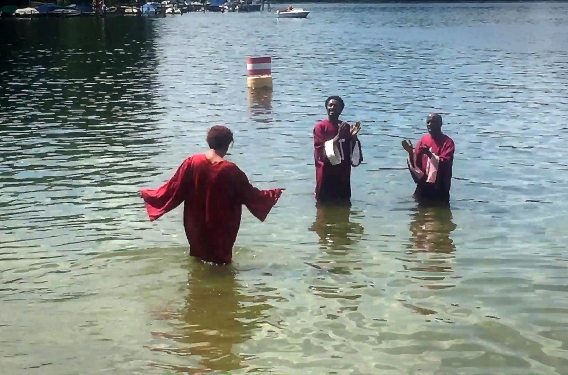December 11, 2018
Faith through the Eyes of Newcomers


On a sunny Sunday afternoon in Berlin, Germany, a congregation of immigrants and refugees from Eritrea gathered by a lake for worship and baptisms.
That same day, something inside Suzanne*, a natural-born German citizen, told her to go for a bike ride.
“I have heard German believers say they believe God has sent this large influx of refugees to Germany in order to bring renewal to the German Church,” said Resonate Global Mission missionary David Kromminga.
More than one million refugees have crossed Germany’s borders, with tens of thousands settling in Berlin. They are often fleeing repressive societies and war-torn countries. In Eritrea, many young men face forced conscription into the military with no prescribed end date. They might be drafted into the army and never released from service.
“It is a huge fear, especially for young men,” said David. “A lot of young men have fled. Many of them have had a harrowing journey here from North Africa and the Middle East.”
David and his wife, Mary Buteyn, partner with the Berliner Stadtmission (Berlin City Mission). They walk alongside congregations of immigrants and refugees and help connect them with the larger German Church. That’s how they became acquainted with the congregation of Eritreans. Originally formed as a Bible study three years ago, the church has grown into a worshipping body with 40 to 60 Eritreans attending each week—and it’s still growing.
“People keep coming to this congregation,” said David. “We’re thrilled with this relationship.”
While David and Mary help immigrant and refugee congregations connect to the larger German Church, they also realize what these new arrivals can bring to Germany and to the larger Christian community
“I think the exciting thing about these new immigrant groups coming to Germany is that there is an opportunity for people to re-experience the Christian faith in a new way and through the eyes of others,” said David. “In a sense, that’s not different from when a friend of yours comes to Christ and you get to experience your faith through his or her eyes.”
One afternoon, the congregation invited David and Mary to join them for worship and baptisms at a lake in Berlin. As the congregation stood in a circle, praying and praising God with choruses of “hallelujahs” and “amens,” David witnessed a baptism of another sort among local bystanders.
“They’re fairly charismatic in their worship style—and loud,” said David. “Wow. It is very loud. Their singing, clapping, and praying fascinated the majority-culture Germans who were walking or biking past or sunbathing at the beach.”
Including Suzanne, who felt something inside her telling her to go for a bike ride around the lake that day.
David notes that Germans are generally private and reserved about matters of faith. Some may have themselves been baptized but haven’t been part of a worshiping congregation for many years, if ever. But David noticed Suzanne was captivated by the worship, and he risked a conversation with her.
“Eritrea is one of the most repressive countries in the world,” he said.
“Oh, I know that,” she said. “There’s just such an energy here in this group. I had to stop. I’m getting goosebumps.”
David asked if she was religious, but she quickly shot back that it was a difficult topic for her, and David let the conversation drop. But he invited her to stay for the remainder of the worship service and baptisms—and she did, for a little bit, until slipping away.
“One of the most comforting stories of Jesus that has encouraged my work is the parable in Mark 4 of the seed that grows by itself,” said David. “There’s this farmer, and he throws some seed on the ground, and, it says, whether he sleeps or whether he wakes, the seed grows. I kind of see myself as throwing some gospel seed around … I’ve got to trust that God has the power to make something out of that, that I simply don’t have.”
And David, Mary, and many of the Christians they work with believe that God is working in powerful ways through these congregations of immigrants and refugees from Eritrea and countries around the world. While many have faced immense hardship and find themselves in a strange land, God is working in and through their lives. He’s not only giving them new life, but stirring native Germans to see him in new light.
“[Suzanne] was obviously interested in what was happening in their exuberant and heartfelt worship—and she admitted that herself: there was something drawing her that day to that group of people,” said David.
“As people from different nations come together, by his Spirit and sometimes in the strangest ways, God is drawing all sorts of people to himself, adding to Christ’s church and building his kingdom.”
*Name changed for privacy
This story was originally published on The Network.